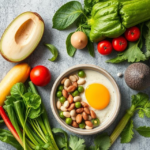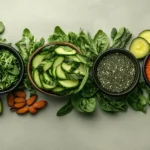Diabetes is a chronic condition that affects millions worldwide, requiring a well-structured diet for effective management. The right nutrition plays a crucial role in regulating blood sugar levels, preventing complications, and improving overall health. A diabetes-friendly diet includes low glycemic index (GI) foods, fiber-rich meals, and balanced macronutrients to keep glucose levels stable.
In this guide, we will explore the best dietary strategies for diabetes management, essential nutrients, meal planning tips, and foods to avoid.
Understanding Diabetes and the Role of Nutrition
Diabetes occurs when the body cannot properly process glucose due to insulin resistance (Type 2) or insufficient insulin production (Type 1). Nutrition plays a key role in:
✔ Regulating blood sugar and preventing spikes
✔ Maintaining a healthy weight to reduce insulin resistance
✔ Lowering the risk of diabetes complications, including heart disease
The Glycemic Index (GI) and Its Importance
The Glycemic Index (GI) measures how quickly a food raises blood sugar. Low-GI foods (GI < 55) are ideal for diabetes as they cause gradual glucose release, preventing sudden spikes.
✔ Low-GI Foods: Whole grains, lentils, leafy greens, nuts
❌ High-GI Foods: White bread, sugary drinks, processed snacks
Best Foods for Diabetes Management

1. Fiber-Rich Foods for Blood Sugar Control
Fiber slows down digestion, preventing sugar spikes. Aim for 25-30g of fiber daily from:
- Vegetables: Spinach, kale, carrots
- Whole Grains: Oats, quinoa, brown rice
- Legumes: Chickpeas, lentils, beans
- Nuts & Seeds: Flaxseeds, almonds, walnuts
2. Healthy Carbohydrates
Choose complex carbs over refined ones to ensure slow sugar absorption.
✔ Best choices: Sweet potatoes, whole wheat, barley, quinoa
❌ Avoid: White rice, pastries, sugary cereals
3. Lean Proteins to Prevent Sugar Spikes
Protein helps stabilize blood sugar and keeps you full longer.
✔ Good options: Chicken breast, tofu, eggs, Greek yogurt, fish
❌ Avoid: Processed meats, fried foods, high-fat dairy
4. Heart-Healthy Fats for Insulin Sensitivity
Healthy fats reduce inflammation and improve insulin function.
✔ Sources: Olive oil, avocados, chia seeds, salmon
❌ Limit: Trans fats, hydrogenated oils, fried foods
5. Superfoods for Diabetes Management
Some foods have powerful blood sugar-regulating properties:
- Cinnamon – May improve insulin sensitivity
- Turmeric (Curcumin) – Reduces inflammation and stabilizes glucose
- Apple Cider Vinegar – Helps lower post-meal blood sugar
- Berries – High in antioxidants and low in sugar
Foods to Avoid for Better Diabetes Control
❌ Sugary Foods – Cakes, candies, soda
❌ Refined Carbs – White bread, pasta, processed grains
❌ High-Sodium Foods – Processed meats, canned soups
❌ Unhealthy Fats – Fried foods, margarine, fast food
❌ Alcohol & Sugary Beverages – Raises blood sugar levels rapidly
Smart Meal Planning for Diabetes Management
1. Follow the Diabetes Plate Method
- ½ Plate – Non-starchy vegetables (broccoli, spinach, peppers)
- ¼ Plate – Lean proteins (chicken, fish, tofu)
- ¼ Plate – Whole grains (quinoa, brown rice, oats)
- Healthy Fat – Avocado, olive oil, nuts
2. Meal Timing and Portion Control
- Eat small, frequent meals to maintain stable blood sugar levels
- Avoid skipping meals, which may cause sudden glucose fluctuations
- Practice portion control by using smaller plates and measuring servings
3. Hydration and Its Role in Diabetes
- Drink water instead of sugary drinks
- Herbal teas and infused water can be good alternatives
- Avoid excess caffeine, as it can impact glucose levels
Diabetes-Friendly Diet Plans
1. Mediterranean Diet for Diabetes
✔ High in healthy fats, fiber, and antioxidants
✔ Rich in whole grains, nuts, legumes, and fish
✔ Low in processed foods and refined carbs
2. Low-Carb Diet for Blood Sugar Control
✔ Emphasizes protein, healthy fats, and non-starchy vegetables
✔ Helps reduce insulin resistance and weight
3. Plant-Based Diet for Diabetes
✔ Focuses on fiber-rich plant foods (vegetables, legumes, whole grains)
✔ Reduces cholesterol, inflammation, and blood sugar spikes
Supplements for Diabetes Management
Some natural supplements may help regulate blood sugar:
✔ Magnesium – Supports insulin function
✔ Chromium – Helps with glucose metabolism
✔ Omega-3 Fatty Acids – Reduces inflammation
✔ Vitamin D – Supports insulin sensitivity
(Always consult a doctor before taking supplements.)
Exercise and Lifestyle Tips for Better Blood Sugar Control
✔ Engage in 30–45 minutes of physical activity daily (walking, yoga, strength training)
✔ Manage stress levels through meditation and deep breathing
✔ Get quality sleep, as poor sleep increases insulin resistance
✔ Monitor blood sugar regularly to track progress
Final Thougths
A balanced, diabetes-friendly diet is essential for maintaining stable blood sugar levels, preventing complications, and improving overall well-being. By focusing on low-GI foods, fiber, lean proteins, and healthy fats, you can take control of your diabetes naturally. Combine good nutrition with exercise, stress management, and proper hydration for the best results.
Would you like a personalized diabetes meal plan? Share your thoughts in the comments!
Related posts:
 Food is Medicine: Unlocking the Healing Power of Nutrition for Lifelong Health
Food is Medicine: Unlocking the Healing Power of Nutrition for Lifelong Health
 Best Foods for Rainy Season – Monsoon Diet Tips for a Healthy Life
Best Foods for Rainy Season – Monsoon Diet Tips for a Healthy Life
 Top 10 Superfoods You Should Add to Your Diet in 2025
Top 10 Superfoods You Should Add to Your Diet in 2025
 Unlocking the Secrets of Sleep: How Sleep Physiology Shapes Brain Function
Unlocking the Secrets of Sleep: How Sleep Physiology Shapes Brain Function
 New COVID-19 Variant 2025: Symptoms, Spread, and Safety Measures You Must Know
New COVID-19 Variant 2025: Symptoms, Spread, and Safety Measures You Must Know
 Is COVID-19 Becoming Endemic in India? An In-Depth Analysis?
Is COVID-19 Becoming Endemic in India? An In-Depth Analysis?
